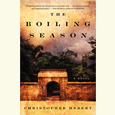Porch-Building
In launching a nonprofit literary center, a writer nurtures her own creative life in surprising ways
It started in the fall of 2009 with my neighborhood listserv, a thing of dubious worth unless your dog is lost or you want to broadcast your dissatisfaction with a local restaurant. Into this soup I dropped my modest inquiry: I’m offering a creative-writing workshop. Anyone interested? Lo and behold, the listserv delivered, efficiently, three men and three women. For six weeks that fall, they gathered around the table with me and my husband, our small East Nashville home awake with the scent of freshly brewed coffee. The class ran until 10:30 at night. I’m not sure how I handled those hours with a toddler who rose at dawn. Maybe because I was quietly pursuing a dream.
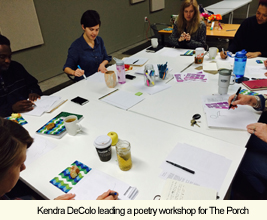 I’ve worked as a college teacher, a magazine editor, and a freelance writer, but I toyed for years with the idea of offering private writing classes. The year after my first novel was published, my family and I moved to Nashville, my hometown, and I finally decided to give it a shot. The workshop went well, and so did a second. By the following fall I decided to add a class for beginners, structured around writing exercises. This time, we’d meet at a coffee shop in my neighborhood.
I’ve worked as a college teacher, a magazine editor, and a freelance writer, but I toyed for years with the idea of offering private writing classes. The year after my first novel was published, my family and I moved to Nashville, my hometown, and I finally decided to give it a shot. The workshop went well, and so did a second. By the following fall I decided to add a class for beginners, structured around writing exercises. This time, we’d meet at a coffee shop in my neighborhood.
Six women gathered around a few tables I pulled together on the second floor of Portland Brew East. Over the next six Sundays, they bravely shared their writing, some for the first time. Their enthusiasm and laughter were contagious, their easy camaraderie a stroke of luck. Workshops don’t always give rise to a circle of friends, but this one did. I could see that much. What I couldn’t see yet was how it was also working as the start of something else.
“I think I want to start a nonprofit—a literary center,” I told my friend Gretchen. It was March 2012, and we were in Boston for an annual conference of creative writers. Cozied up in a dark, chic restaurant in the middle of a snowstorm, we had lots of catching up to do. Gretchen listened as I rambled. I’d been teaching these private classes for four years. It seemed time to do more, and I knew exactly what that more could be: something like The Loft in Minneapolis, or like Boston’s own Grub Street. Something bigger than me. “Nashville needs this kind of thing,” I said, a little breathless. “The city’s growing like crazy. I mean, why not?”
Gretchen has known me for a long time, through highs and lows. “This is what you were meant to do,” she said. My arms tingled—she got it. And I wanted to believe she was right.
Why not? Actually, I’m pretty good at coming up with reasons why not: Who do I think I am? What kind of place do I think I’m in? Can this idea possibly fly?
Crises of faith are part of my natural rhythm. After that spring of inspiration came a summer of doubt: I continued to teach my community classes, continued to run my idea by people whose opinions I respected. But all I saw was a dark gulf between idea and execution. All that paperwork, and it’s gonna cost what? Board of directors, what? By-laws, what? Logo, branding, website—omg.
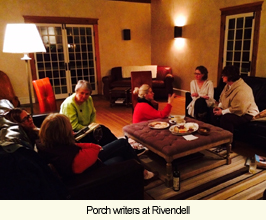 I’ll get in over my head. I’m an introvert. I live paycheck to paycheck.
I’ll get in over my head. I’m an introvert. I live paycheck to paycheck.
But I kept thinking, talking, asking questions. The writers from that first coffee-shop class urged me on: “You should totally do it!” More nods came from my writing group, and one of them, Katie McDougall, was all in. “I’d really like to be a part of this,” she said. Katie shored me up as I dragged myself through a season of doubt.
And then a turn, as if in a poem.
I had a little money set aside from a fellowship, money I’d mostly spent on writing residences. I decided to use the rest of the funds to get a logo developed, build a website. An identity. I would start there. Was it back-asswards, throwing money at the look and feel of a thing before the thing itself existed? My gut said not. Somehow, starting with a name—The Porch Writers’ Collective—and a logo and a color palette would make it real. Real enough that I couldn’t run the other way.
I checked in with Katie: “So, do you want to be my cofounder?” I asked, a little tentatively, doubting anyone else could possibly want this the way I did, especially with no income involved. But Katie would prove me wrong. Here, finally, was the missing piece, the engine of another mind to turn vision into reality. A vision is a far cry from execution, and doubt and I go back a long way. But with Katie by my side, I’ve been forced to kick doubt to the curb.
We have spent the past year shaping our story, trying to make the vision as clear to others as it has become to us. We talk about what The Porch is and what we want it to become. We talk about how we want Nashville to be as welcoming and nurturing a place for writers as it has become for other artists.
There are signs that people are getting it. There’s the recent email from a woman who’s planning to move to Nashville; she’s happy we have something akin to the writing center where she’s been taking classes in L.A. There’s the young mother of five, determined to carve out some time to exercise a voice that has Personal Essayist written all over it. When she tells me she’s glad we’re doing this, I just want to smoosh her face with kisses. Because I am glad for her, and for every single person who has stepped onto The Porch—people who have given us advice, or attended one of our classes, or partnered with us on an event, or, best of all, surprised themselves with their own writing.
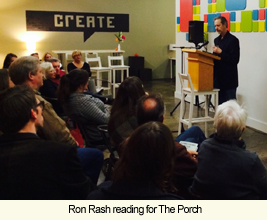 Not that we haven’t heard some doubts, too, though Katie and I were ready for that. It’s one thing to stake your own claim in familiar territory; it’s another to introduce a completely unfamiliar concept to a new audience. People don’t just instantly get the vision of a literary center if they’ve never heard of one. Convincing them is one of our jobs.
Not that we haven’t heard some doubts, too, though Katie and I were ready for that. It’s one thing to stake your own claim in familiar territory; it’s another to introduce a completely unfamiliar concept to a new audience. People don’t just instantly get the vision of a literary center if they’ve never heard of one. Convincing them is one of our jobs.
There is value in simply stating an idea over and over, in coming back to it day after day and simply refusing to let go. Articulating an idea to others, you articulate it to yourself. Working on that idea, you make it real. You gird your own belief.
But Katie and I have done more than talk, too. In our first year we’ve offered dozens of workshops in fiction, nonfiction, and poetry, and numerous public events in partnership with other organizations, always to a warm reception. We’ve won our first grant, and we’ve taught poetry and story-writing to fourth and fifth graders in the Time to Rise program. We’ve brought in accomplished poets such as Bill Brown, Kendra DeColo, and Jeff Hardin to teach classes for us, and we’ve hosted author Ron Rash for a reading from his new story collection. We’ve offered a short story contest in partnership with the Nashville Reads program, and we’ve presented a panel discussion on writing and publishing books for children.
Not least, we’ve secured a physical home at the Skillery, a coworking space in Nashville’s Germantown neighborhood, where we hold events and our classes. Which means we actually purchased furniture. Talk about a big step. But what’s even more exciting to me right now? Everything we already have planned for our second year of operation—including a fundraiser featuring the iconic American author Tim O’Brien and bluegrass legend Tim O’Brien. (“A Tale of Two Tims,” we’ve dubbed it.)
“It’s really happening!” people say now.
“Yes!” I say, all grins. Too really-happening to back out now, Felts. Yes, I’m delighted. Yes, I’m terrified.
Back in 2012, at that conference in Boston, I attended a panel discussion led by the directors of several literary centers around the country. During the Q&A, somebody asked the panelists how creating a literary center had affected their own writing lives.
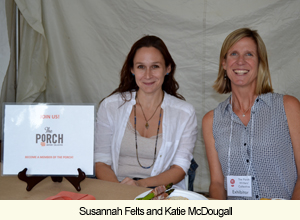 Cue the sheepish smiles: these were writers making it possible for others to write, it turns out, and as a result not doing much writing of their own. Well, I thought stubbornly, I’ll be the exception to that rule. Today I find myself pondering the tally of hours I’ve spent Porch-building, wondering where my next book would be if I’d given those hours to novel-making. But I think I knew it would come to this in the end, and I was willing to accept the sacrifice.
Cue the sheepish smiles: these were writers making it possible for others to write, it turns out, and as a result not doing much writing of their own. Well, I thought stubbornly, I’ll be the exception to that rule. Today I find myself pondering the tally of hours I’ve spent Porch-building, wondering where my next book would be if I’d given those hours to novel-making. But I think I knew it would come to this in the end, and I was willing to accept the sacrifice.
Meanwhile, I squirrel away quotes about the writing life and links to interviews with writers; I binge-buy craft books; I get giddy at the prospect of sharing amazing stories and essays with future students. I felt the same way when I was teaching for other institutions, but somehow I feel a greater urgency now, a greater rush from sharing the gospel of the writing life with others. That rush is real and unfailing in its returns—a reward I confess I don’t always get from the daily, private struggle with words on the page. Maybe that’s why I don’t want to quit this work—teaching and community-building—even as it demands greater shares of my time.
The demands and dialogues and discoveries of teaching have no doubt been my best education as a writer. Dissecting an intricate scene in a story by, say, Claire Vaye Watkins or Bonnie Jo Campbell leaves an afterimage of their narrative blueprints on my mind, and with any luck I can access them later, when I’m deep into my own scene construction. And after identifying the hot spots and hairline fractures in student work, I see anew the strengths and weaknesses in my own. It’s like a private seminar, this life, one in which I’m both teacher and student, poring over stories and essays that I go on to use as examples in a workshop. When my students make observations about one another’s work, I learn. When I forget to bring a handout, or fail to meet my own expectations in the classroom, I like to think I learn then, too.
This is what I’m telling myself, anyway—that the hours I’ve lost to writing this year will be made up in due time. The Porch is just beginning. In some important ways I’m just beginning.
It occurred to me not long ago that Katie and I are entrepreneurs. That’s a word I never would have believed could possibly apply to me, a league in which I couldn’t possibly belong. But what I see in The Porch is a gift I want to give Nashville, my hometown. (Please forgive the blatant borrowing of Ann Patchett’s line about Parnassus Books, but writers do steal.) Sure, it benefits me, too: I want a place that nurtures writers because I am a writer and a teacher of writing, but sometimes selfishness, deployed correctly, can get a whole lot of good done in the world.
It’s too soon to say whether The Porch is a path toward something like an identity, or even a career. And that’s fine: I like a heavy splash of unknown in my future. But I have to believe it’s all part of something bigger. In the end, these are just the things we all tell ourselves every day, a negotiation with the world beyond and a negotiation with the self. And these are the things we alchemize into stories to share with others. All of it serves a purpose.

Last month, Katie and I hosted our second writing retreat at Rivendell Writers’ Colony in Sewanee, Tennessee. We brought in Leigh Anne Couch, managing editor of The Sewanee Review, for an informal discussion; we gathered for readings and craft talks. The seven participants came at writing from all angles: one was a published poet finishing a draft of a memoir; another, the author of several novels for young readers, was working through a tough scene in a new project; another was a young woman in the process of discovering that writing was something she wanted to devote herself to. Everybody came for their own reasons, and I think they all found what they were looking for. Ultimately, we provided the space and time—and some good meals and wine—and they made of it what they needed. “This is so fun,” said a woman finding her way back to her voice after losing her husband. “I’m writing again! I thought that part of me had died.”
I didn’t get a lick of my own writing done that weekend, and I didn’t care. Making that space for others nourished me, reassured me that what I was doing was meaningful work. Hearing the appreciative responses afterwards, I had a moment of clarity: this is something I want for my writing life—the steady cultivation of writing lives around mine.
I’m still stumbling forward in the dark, dodging puddles of doubt, beckoned on by occasional beams of light. Katie is a regular source of that light. So is Rivendell itself, and the writers who joined us there, the emails from strangers, the writers who have become Porch members, the business owners who have supported us, the many creative entrepreneurs in Nashville who inspire us. Today, I’ll write a recommendation letter for a former Porch student who’s applying to M.F.A. programs. It’s an honor to be able to do so. It’s no less, and no more, than the making of a life.

Susannah Felts is a writer, editor, and educator in Nashville, as well as co-founder of The Porch Writers’ Collective, a nonprofit literary center. She is the author of This Will Go Down On Your Permanent Record, a novel, and numerous journal and magazine articles.


